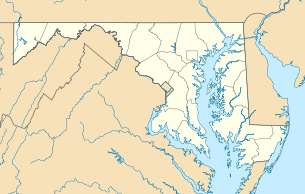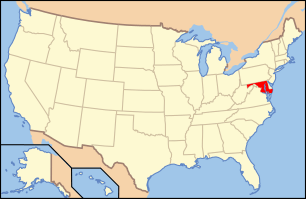David Taylor Model Basin
|
Taylor, David W., Model Basin | |
 | |
 | |
| Location | Bethesda, Maryland |
|---|---|
| Coordinates | 38°58′27″N 77°11′22″W / 38.97417°N 77.18944°WCoordinates: 38°58′27″N 77°11′22″W / 38.97417°N 77.18944°W |
| Built | 1938 |
| Architect | Turner Construction Co. |
| Architectural style | Art Deco |
| Governing body | DEPARTMENT OF THE NAVY |
| NRHP Reference # |
85003231 [1] |
| Added to NRHP | October 17, 1985 |
The David Taylor Model Basin (DTMB) is one of the largest ship model basins—test facilities for the development of ship design—in the world. DTMB is a field activity of the Carderock Division of the Naval Surface Warfare Center.
| “ | The purpose of the David Taylor Model Basin is to make accurate and reliable predictions of the performance of ships by research on models. | ” |
History
In 1896, David Watson Taylor designed and supervised construction of the Washington Navy Yard's Experimental Model Basin which was at that time the best facility in the world. That facility was a significant design testing capability before, during, and after World War I. Inadequacies in that facility led the navy to look for a new model capability.
The new navy modeling facility — named for David Taylor — was built in 1939 in today's community of Carderock just west of Bethesda, Maryland in Montgomery County. The Carderock facility contains multiple test basins designed for a variety of testing capabilities. DTMB has been a pervasive influence on naval architecture for 70 years.
Technical capabilities
Three adjoining sections comprise the Shallow Water Basin: deep water, shallow water, and a J-shaped turning basin used for steering maneuvers. Its carriage can provide speeds up to 18 knots.
The Deep Water Basin has a pneumatic wavemaker located at one end, and a wave absorbing beach at the other. This capability allows modeling of regular or irregular sea states. Located behind a movable section of the beach is a fitting out dry dock. Its carriage can provide speeds up to 20 knots.
The High-Speed Basin comprises two adjoining sections: a deep water section and a shallow water section. Wavemaking capability exists in this basin, and there are three large underwater viewing windows at different elevations which are set into the wall about mid-length. The high-speed carriages can provide complex motions for the model at speeds up to 50 knots.
Computing
The David Taylor Model Basin was an early user of computers, and an active site for computer technology. Represented by Betty Holberton, it was one of three government agencies present at the 1959 meeting where the computer language COBOL was created.[2] It also had one of the two UNIVAC LARCs that were built.
Significant naval contributions
References
- ↑ "National Register Information System". National Register of Historic Places. National Park Service. 2008-04-15.
- ↑ Sammet, Jean (1978). "The Early History of COBOL". ACM SIGPLAN Notices (Association for Computing Machinery, Inc.) 13 (8): 121–161. doi:10.1145/960118.808378. Retrieved 14 January 2010.
- ↑ "A Historical Mechanical Engineering Landmark" (pdf). Retrieved 2011-01-04.
- ↑ "David Taylor Model Basin". Retrieved 2011-01-04.
- ↑ "Facility Data Sheet -Shallow Water Basin". Retrieved 2011-01-04.
- ↑ "Facility Data Sheet - Deep Water Basin". Retrieved 2011-01-04.
- ↑ "Facility Data Sheet - High Speed Basin". Retrieved 2011-01-04.
Further reading
- Carlilse, Rodney (1998). Where the Fleet Begins: A History of the David Taylor Research Center. Dept. of the Navy. p. 689. ISBN 978-0160494420.
- Conn, Virginia (1971). The David Taylor Model Basin: A brief history. Naval Historical Foundation. p. 28. ASIN B000710GA6.
External links
| Wikimedia Commons has media related to David Taylor Model Basin. |
- Taylor Model Basin
- Carderock Division, Naval Surface Warfare Center
- American Society of Mechanical Engineers
- David W. Taylor Model Basin, Montgomery County, at Maryland Historical Trust
| |||||||||||||||||||||||||

